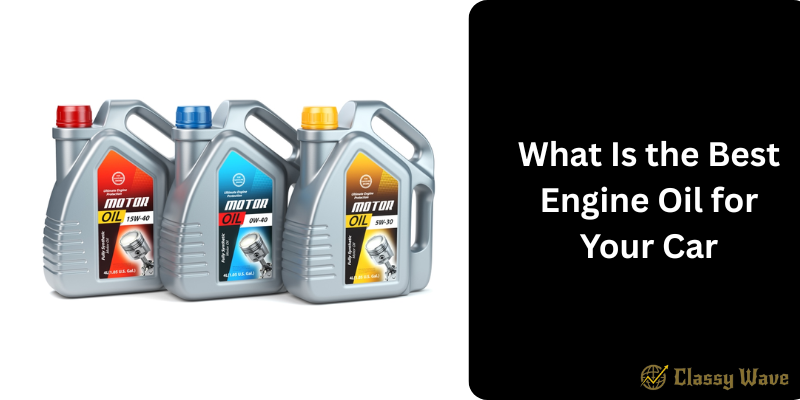What Is the Best Engine Oil for Your Car | Classy Wave
Choosing the right engine oil for your car is one of the most important decisions for maintaining your vehicle’s performance, fuel efficiency, and longevity. But with so many brands, types, and grades available, it can get confusing fast. Don’t worry — by the end of this article, you’ll know exactly how to pick the best engine oil for your car.
Why Engine Oil Matters
Engine oil is like the lifeblood of your vehicle. It keeps all the moving parts lubricated, prevents overheating, and helps reduce wear and tear on the engine. Without proper oil, your engine could overheat, seize up, or even fail completely.
The Main Functions of Engine Oil
- Lubrication: Reduces friction between metal parts.
- Cooling: Helps absorb and dissipate heat.
- Cleaning: Removes dirt, debris, and sludge.
- Protection: Prevents corrosion and engine wear.
Types of Engine Oil
There are several types of engine oils available, each with its own benefits and uses. Here’s a breakdown:
1. Conventional Oil
This is the most common and affordable type. It’s ideal for simple engines and older vehicles that don’t require high-performance oils.
Best for: Drivers with regular, low-mileage cars.
2. Synthetic Oil
Synthetic oils are chemically engineered to offer better performance, stability, and protection. They perform well in both extreme cold and hot temperatures.
Best for: High-performance or modern vehicles that demand top-level protection.
3. Synthetic Blend Oil
A mix of conventional and synthetic oils, this type gives you better performance than regular oil but at a lower cost than full synthetic.
Best for: Drivers who want a balance of cost and performance.
4. High-Mileage Oil
This oil is specifically designed for cars with over 75,000 miles. It contains additives that help prevent oil leaks and reduce engine wear.
Best for: Older cars or vehicles with high mileage.
Understanding Viscosity Grades
When you see numbers like 5W-30 or 10W-40 on oil bottles, that’s the viscosity rating. It tells you how thick or thin the oil is at different temperatures.
- The first number (before the W) indicates how the oil performs in cold weather.
- The second number shows how it performs when the engine is hot.
For example, 5W-30 means it flows easily in cold temperatures (5W) and remains stable at high temperatures (30).
How to Find the Right Oil for Your Car
1. Check Your Owner’s Manual
The best place to start is your car’s manual. It specifies the recommended oil type, viscosity grade, and whether synthetic or conventional oil is preferred.
2. Consider Your Driving Conditions
If you drive in extreme heat, cold, or dusty environments, you might need synthetic oil for better protection.
3. Pay Attention to Mileage
If your car has crossed 75,000 miles, switch to high-mileage oil to keep it running smoothly.
4. Look for API and SAE Certifications
Always choose engine oils that meet the API (American Petroleum Institute) and SAE (Society of Automotive Engineers) standards. You’ll find their seals on the packaging.
Top Engine Oil Brands to Consider
While there are many good options, here are some trusted names in the market:
- Mobil 1 – Known for advanced synthetic oils.
- Castrol EDGE – Excellent for performance engines.
- Valvoline – Reliable all-rounder with high protection.
- Shell Helix – Great for smooth engine performance.
- Pennzoil Platinum – Known for cleaning and protecting engines.
Common Myths About Engine Oil
Myth 1: You Should Change Oil Every 3,000 Miles
Not always! Modern oils can last up to 7,500–10,000 miles. Always follow your manufacturer’s recommendation.
Myth 2: Synthetic Oil Causes Leaks
This is outdated. Modern synthetic oils are formulated to prevent, not cause, leaks.
Myth 3: Thicker Oil Protects Better
Not necessarily. Using oil that’s too thick can reduce efficiency and cause engine strain.
When to Change Your Engine Oil
Typically, you should change your engine oil every 5,000 to 7,500 miles. However, this can vary depending on:
- The type of oil used
- Your driving habits
- Road and weather conditions
Always check the oil level and color regularly. If it’s dark and dirty, it’s time for a change.
Benefits of Using the Right Engine Oil
- Increases fuel efficiency
- Improves engine life
- Reduces emissions
- Provides smoother rides
- Protects engine parts from corrosion
Signs You’re Using the Wrong Engine Oil
- Engine knocking or ticking sounds
- Overheating issues
- Reduced fuel efficiency
- Oil leaks or low oil pressure
If you notice these symptoms, switch to the correct oil immediately.
How to Change Your Engine Oil (Step-by-Step)
- Park your car on a level surface and let the engine cool.
- Place a drain pan under the oil plug.
- Remove the plug and let the old oil drain completely.
- Replace the oil filter.
- Pour in the new engine oil (check the manual for exact quantity).
- Start the engine for a few minutes, then check the oil level again.
Eco-Friendly Tips for Used Oil
Never dump used oil! Take it to a recycling center or auto service station that accepts used oil. It’s harmful to the environment if disposed of improperly.
Conclusion
Choosing the best engine oil for your car isn’t complicated once you understand your vehicle’s needs, driving habits, and manufacturer’s recommendations. The right oil not only enhances performance but also extends the life of your engine. Always use certified brands and change the oil regularly to keep your car in top condition.







